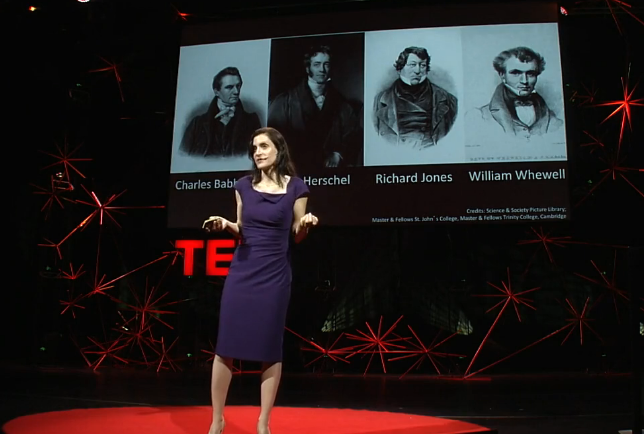I first found out about this confrontation when I was in graduate school, and it kind of blew me away.
我第一次听说这个故事的时候还在念研究生,这个故事让我太惊讶了。
I mean, how could the word scientist not have existed until 1833?
我是说“科学家”这个词怎么可能是1833年才出现的?
What were scientists called before?
在那之前科学家们如何称呼自己?
What had changed to make a new name necessary precisely at that moment?
在那个年代,创造一个新的名字带来了什么改变?
Prior to this meeting, those who studied the natural world were talented amateurs.
在这次会议之前,研究自然世界的人都是一些很有天赋的爱好者。
Think of the country clergyman or squire collecting his beetles or fossils,
他们会是镇上的牧师或乡绅,热衷于收集甲虫或化石标本,
like Charles Darwin, for example, or, the hired help of a nobleman, like Joseph Priestley,
比如达尔文,又如发现了氧气的约瑟夫·普利斯特里,
who was the literary companion to the Marquis of Lansdowne when he discovered oxygen.
他当时是兰斯顿侯爵的陪读。

After this, they were scientists,
在那之后,他们都成为了科学家,
professionals with a particular scientific method, goals, societies and funding.
有特定的研究方法、目标、团体和资金支持的专业研究人员。
Much of this revolution can be traced to four men who met at Cambridge University in 1812:
许多革新都可以追溯到1812年在剑桥大学聚会的四个人:
Charles Babbage, John Herschel, Richard Jones and William Whewell.
查尔斯·巴贝奇,约翰·赫歇尔,理查德·琼斯和威廉姆·胡威立.
These were brilliant, driven men who accomplished amazing things.
这四位领军人物都非常智慧并且成果颇丰。
Charles Babbage, I think known to most TEDsters,
我想大多数TED听众都知道查尔斯·巴贝奇
invented the first mechanical calculator and the first prototype of a modern computer.
他发明了第一台机械计算机以及第一代计算机的原型。
John Herschel mapped the stars of the southern hemisphere,
约翰·赫歇尔制作了南半球的星图,
and, in his spare time, co-invented photography.
并且在他的业余时间与他人共同发明了照相技术。
I'm sure we could all be that productive without Facebook or Twitter to take up our time.
我相信如果我们戒掉脸书和推特,我们也能这么高产的。












